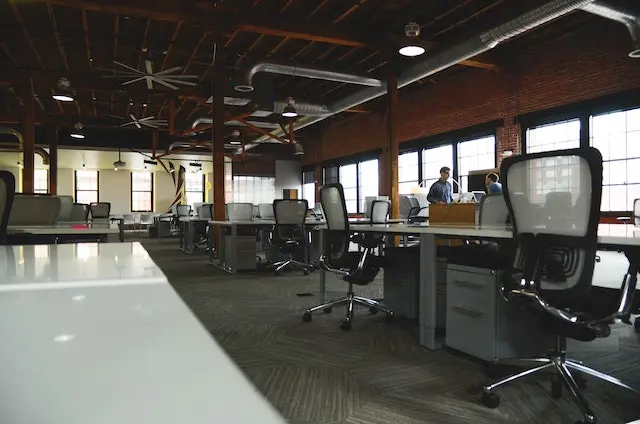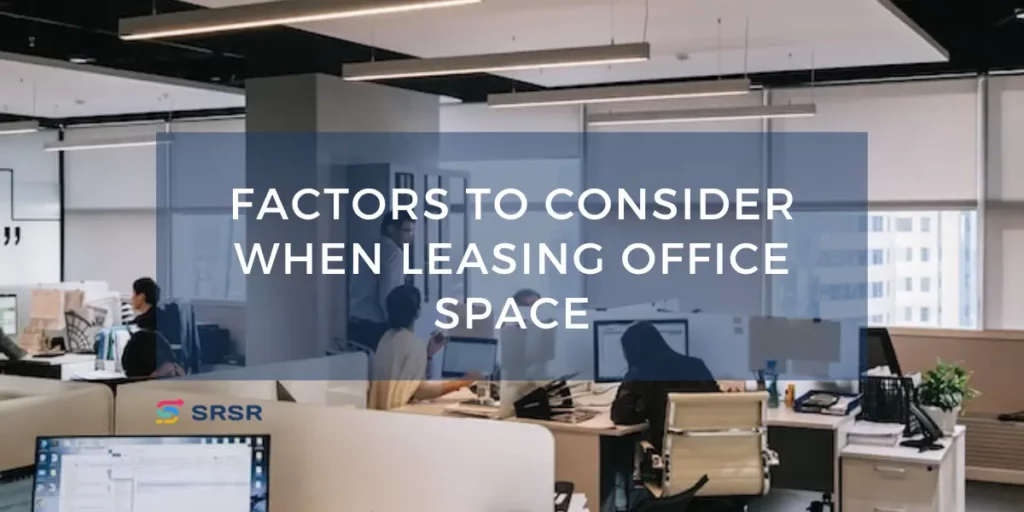Growing pains are a good problem to have as a business, and one of those growing pains often involves the need to lease office space. The right office space can encourage hard work and collaboration. It also helps keep employees happy and keeps your company organized and efficient.
Whether you’re leasing your first space or looking to upgrade your current office space into something bigger, there are many details to consider before you sign your lease agreement.
Location, location
The first three rules of residential real estate are location, location, location, and that’s no different for office space.
A great office location can mean different things to different companies. If clients regularly come to visit your office, you’ll want a location with plenty of parking and one that’s easy to access and find. For some types of businesses, it may be beneficial to be located within walking distance of other businesses or to find a location a good distance away from competitors.
On the other hand, if your business only has employees coming to work, a good location could be somewhere close to where employees live or one with access to public transportation to help employees get to work more efficiently. You may also want to consider the distance to local restaurants, coffee shops, or gyms. This gives employees the chance to grab a bite to eat on their lunch break or hit the gym on their way home after work.

Size
Size is one area that can be difficult to consider when leasing office space. Not only do you need to find the right size space for your current team, but you also need to plan for future growth. Many leases are for a minimum of three years, and you don’t want to outgrow your space before your lease ends!
However, adding too much extra space also comes with added expenses such as a higher lease amount and possibly even extra utility costs. Carefully consider and plan how you’ll use your space and try to estimate how your company will grow over the next few years.
Layout
The ideal office layout varies wildly. Offices with collaborative working styles may benefit from a more open layout with plenty of room for coworkers to gather and discuss projects. Cubicles with low walls, an open layout, and a few dedicated meeting rooms may work perfectly for this type of office.
However, some companies have working styles that demand more privacy. If employees need to focus quietly on their work or spend a lot of time making phone calls that could disturb other employees, your office space may need a completely different layout. It’s important to consider how the layout of your office space can help or hinder your employees as they are working, and this is definitely something to consider before signing a lease.
Lease agreement
Lease agreements can have several nuances and differences, so it’s important to be sure you understand the entirety of your lease before signing anything. Some of the things you might want to consider before signing a lease:
- How long is the lease?
- What are the renewal options?
- Is there room to grow/expand if your business grows?
- What modifications are you allowed to make to the building?
- What happens if you need to break the lease?
- What parts of utilities, maintenance, operating expenses, etc., will you need to pay for? What does the owner cover?
- Who is responsible for repairs and improvements to the property? Consider factors like air conditioning units and plumbing, which may affect multiple tenants.
These agreements can be complex, and tenants can be surprised by rate hikes or unexpected expenses built into the lease agreement. Leases can even include provisions about what happens in the event of a conflict, such as requiring arbitration or requiring action within a certain number of days. They can also include provisions requiring the tenant to continue paying for a property even if they no longer occupy it or other extraordinary factors that tenants would never agree to if they fully understood the lease. To help avoid surprises, have an attorney review your lease agreement, and don’t be afraid to negotiate with the rental company.

Amenities
How can your office space make life easier or more enjoyable for your employees? Some amenities could be things like plenty of windows with natural light or easy access to parking in a covered parking garage. Some office spaces might even have a cafeteria where employees and visitors can pop in for lunch, fully equipped gyms, or outdoor spaces where employees can enjoy the sunshine and fresh air during their breaks. Building security and on-site services like dry cleaning or shopping are a few more office space amenities your employees may appreciate.
Amenities aren’t just for you and your employees. They can be for your customers, too. Either way, amenities can be a big benefit for your business, helping you attract and retain employees and making customers more likely to visit you.
Accessibility
Employees need to easily get from their homes to the office. Leasing an office space with easy access from major roadways will make their trip more efficient, and being along a public transportation route will help, too. Most employees prefer a shorter commute, so choosing an ideal location for your employees can boost morale and help retain employees.
Accessibility also means considering access for those with disabilities. For instance, are handicapped parking spots available? Is it easy for wheelchair users to enter the building? Are there elevators with proper openings and enough space to comfortably accommodate wheelchairs? Are all parts of the building accessible to everyone, even those with disabilities?
Creating a safe and inclusive workplace should be a top priority, and choosing an office space that already includes these types of accommodations can ensure your space complies with the Americans With Disabilities Act.
Budget
You may have a budget in mind for leasing an office space, but it’s important to make sure you consider every part of your lease agreement, as well as unseen costs. Make sure you understand how much you’ll need to pay for things like utilities and property management fees and whether these amounts are subject to change each month. And just to make sure you’re not overpaying, check in with office spaces similar to the one you’re considering leasing so you can get an idea of what an appropriate budget would be.
Another aspect of budgeting includes costs outside of what you pay your landlord. You may need to purchase or lease office equipment for your employees. Even if you already have some of these items, moving into a bigger office space might mean you need to buy equipment or office furniture for new spaces such as break rooms or conference areas. Unfortunately, the costs don’t stop there. You’ll also need to consider the cost of moving into your office, as well as any costs for renovation or modifications to the office space to accommodate your team and the way you’ll use the space.
Future expansion
As we mentioned earlier, it’s important to consider your future growth and how your office space will need to accommodate that expansion. How many employees do you have now, and how many do you think you’ll have in a few years? Will growth come with separate teams that need their own areas to work or a need for more meeting rooms? What about storage areas? Is there room within the space you have to add more employees? Can you expand to other areas of the building if you need to?
Leasing a larger space may come with additional costs. If you’re not ready for the commitment, you can always look for an office space that works for you now and plan to sign a short-term lease. This will leave you with an option to move in a few years if you outgrow your space. Alternatively, you can make sure your lease includes a right of first refusal, which would give you the option to lease neighboring office space if/when it becomes available.
Final thoughts on leasing office space
Leasing office space is a major decision, and there are many factors to think about. However, you don’t have to think about it alone! Ask your current employees what they love about your current space and what they would like to see at the new location. You may be surprised by the insights they have, and having them on board before you announce a move to a new space could help with their buy-in and overall company morale.
Having professionals on your side throughout the office lease process can help ensure you think about every aspect of your lease. Besides having an attorney review and negotiate your lease, you can also use a professional like a broker or agent to help you find the best location for your office.
Knowing what to look for in an office space can make all the difference in creating a comfortable and productive work environment for you and your team.

